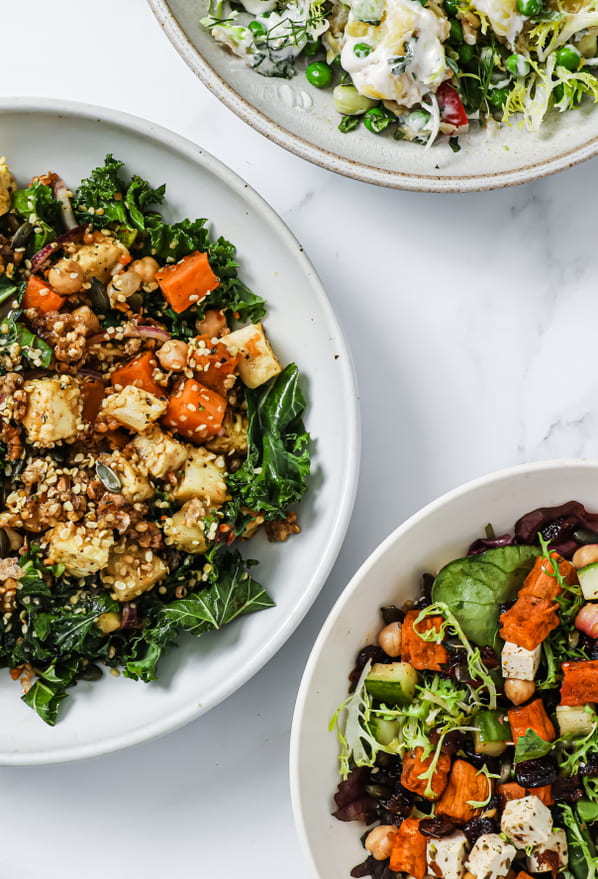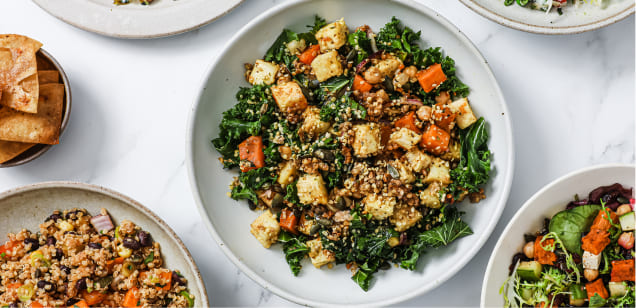Why plant-based?
We know what we eat can have incredibly profound effects – on our health, the environment, and the welfare of animals and people around the globe.
All these aspects are very close to our hearts and are at the core of every decision we make at Holy, from the nutritional balance of our meals, to sourcing organic ingredients and choosing compostable packaging.
You may have noticed, but we’re kind of big into science. And the best research also shows that plant-based eating is the most effective way to positively impact all three of these areas.
Health
Plant-based diets have been shown to be one of the healthiest ways to live – research shows people eating plant-based diets have significantly reduced risk of the most common diseases in the Western world. Science tells us that plant-based diets can:
- Help to fight inflammation, which is an underlying mechanism behind almost every disease and can affect everything from your joints to your skin (1)
- Help to maintain a healthy body weight, thanks to the higher fibre, lower energy density, and higher phytonutrient content (2)
- Fuel superior gut health, by increasing the number and diversity of healthy gut bugs, which in turn positively impacts almost every other system within your body (3)
- Increase longevity – several studies show that those eating plant-based diets tend to live healthier and longer lives! (4)
- Improve exercise performance, thanks to the higher intake of antioxidants, lower intake of saturated fat, improved circulation and efficiency of recovery (5)
Environment
Animal agriculture is a major driver of climate change, water pollution, land degradation, loss of wildlife and biodiversity, deforestation, and ocean destruction. By adopting a plant-based diet, you’re making a huge positive impact on all of these issues. For example, compared to average UK food consumption, plant-based diets typically:
- Use one quarter of the land area
- Release approximately one third of the CO2 emissions
- Require around 30% less fresh water usage (6)
Animals and people
It sounds obvious, but adopting a plant-based diet lowers the demand for animal agriculture, relieving the amount of animal suffering and exploitation. By choosing a plant-based diet, you’re also helping to slow the destruction of our rainforests in order to clear land for raising cattle (or growing the crops to feed them). So you’re helping to protect the habitats of indigenous people and animals like orangutans who rely on these rich ecosystems to survive. And by reducing your carbon footprint with a plant-based diet, you’re helping fight climate change and the devastation that inflicts on humans and animals around the world (7).
Tackling all of these issues is a monumental task, but starting with your plate has been shown to be the most impactful way to make a difference – together we truly can change the world.
References
- Menzel, J., Jabakhanji, A., Biemann, R. et al. Systematic review and meta-analysis of the associations of vegan and vegetarian diets with inflammatory biomarkers. Sci Rep 10, 21736 (2020). https://doi.org/10.1038/s41598-020-78426-8
- Dinu, M., Abbate, R., Gensini, G. F., Casini, A., & Sofi, F. (2017). Vegetarian, vegan diets and multiple health outcomes: A systematic review with meta-analysis of observational studies. Critical reviews in food science and nutrition, 57(17), 3640–3649.
- Glick-Bauer, M. C., & Yeh, M. (2014). The health advantage of a vegan diet: Exploring the gut microbiota connection. Nutrients, 6(11), 4822-4838.
- Hyunju Kim, Laura E. Caulfield, Vanessa Garcia‐Larsen, Lyn M. Steffen, Josef Coresh, and Casey M. Rebholz (2019) Plant‐Based Diets Are Associated With a Lower Risk of Incident Cardiovascular Disease, Cardiovascular Disease Mortality, and All‐Cause Mortali
- Barnard, N. D., Goldman, D. M., Loomis, J. F., Kahleova, H., Levin, S. M., Neabore, S., & Batts, T. C. (2019). Plant-Based Diets for Cardiovascular Safety and Performance in Endurance Sports. Nutrients, 11(1), 130. https://doi.org/10.3390/nu11010130
- Poore, J, & Nemecek, T. (2018). Reducing food's environmental impacts through producers and consumers. Science (American Association for the Advancement of Science), 360(6392), 987-992.
- Nelson Nelson ME, Hamm MW, Hu FB, Abrams SA, Griffin TS. Alignment of healthy dietary patterns and environmental sustainability: a systematic review. Adv Nutr. 2016;7:1005–25.



